
About Andrew Cusack
 Writer, web designer, etc.; born in New York; educated in Argentina, Scotland, and South Africa; now based in London.
Writer, web designer, etc.; born in New York; educated in Argentina, Scotland, and South Africa; now based in London. read more
News
Blogs
Reviews & Periodicals
Arts & Design
World
France
Mitteleuropa
Knickerbockers
Argentina
The Levant
Africa
Cape of Good Hope
Netherlands
Scandinavia
Québec
India
Muscovy
Germany
Academica
A Sad Day in Pretoria
The Proclamation of the Republic and the End of the South African Monarchy
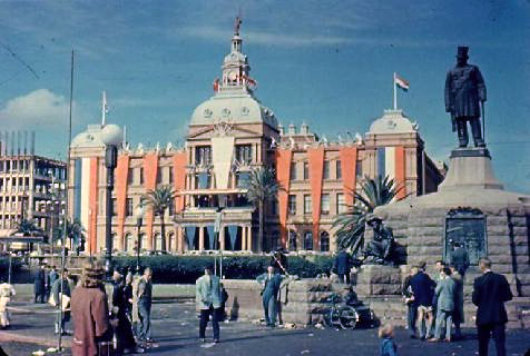
“For every monarchy overthrown, the sky becomes less brilliant, because it loses a star,” wrote Anatole France. “A republic is ugliness set free.” South Africa’s history betrays a long struggle between monarchy and republic, most typified in the horrendous Boer War between the British Empire and the two Afrikaner republics. Many of the Boers were shocked and surprised by the leniency of the British following their surrender to the forces of the Empire, given the brutality inflicted upon the Afrikaner people by the British during the war. Their old republics became colonies but were granted the right to rule themselves within just a few years of that bitter conflict’s end. In 1910, all four British colonies — the Cape, Natal, the Orange River Colony, and the Transvaal — were consolidated in the Union of South Africa, a self-governing dominion which became an independent kingdom after the Statue of Westminster was passed in 1931.
Yet Britain’s munificence towards the defeated people could not assuage the cold-hearted bitterness formed by their cruelty during the Boer War. The term “concentration camp” first arrived in the English language in South Africa, but it was the speakers of Dutch and Afrikaans who were interned in the camps and left without rudimentary medicine or food. The photos of the interned tell the tale better than any words. When the National Party won an outright majority of seats in the South African parliament in 1948, the republican-oriented party began a gradual process of loosening the country’s ties with Great Britain. Just a year later, the Citizenship Act was passed providing for South African citizenship apart from British subjecthood. Previously, any British subject living in South Africa would be considered ‘South African’ after two years of residence. Now, it would take five years of residence for a British subject to gain South African citizenship.
In 1950, the right of appeal to the Privy Council was abolished, and the Supreme Court in Bloemfontein became the court of last instance for the country. In 1957, that court asserted the sovereignty of the Parliament of South Africa (consisting of the Crown, Senate, and House of Assembly) in its ruling over the Collins v. Donges, Minister of the Interior case. That same year the Union Jack ceased to be an official national flag alongside the oranje-blanje-blou, and “Die Stem van Suid-Afrika” was given sole official status as the national anthem; thenceforth the Union Jack and “God Save the Queen” would only be used on specifically British or Commonwealth occasions. The old Royal Navy base at Simon’s Town, founded 1806, was handed over to the South African Navy, though the Royal Navy had continued use of it under a bilateral accord. The creeping republicanism manifested itself in smaller ways too, as with “OFFICIAL” replacing the designation “O.H.M.S.” (On Her Majesty’s Service) on government correspondence.
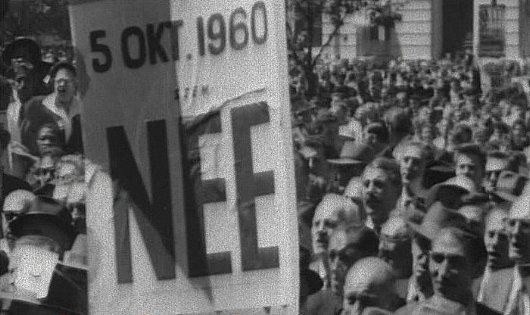
The Nationalists bided their time and waited for just the right moment to abolish the monarchy. In 1960, Prime Minsiter Hendrik Verwoerd announced that a referendum would be held proposing a republican form of government for the Union of South Africa. As a member of the Commonwealth of Nations, South Africa would have to apply to be re-admitted if it became a republic, but a significant bloc of Afro-Asian countries rallied to bar her re-admission because of Apartheid. Verwoerd told parliament that he was “convinced that the influence of Britain, Australia, and Canada, and even India … will ensure that we retain our membership,” but despite those countries best efforts to find a mutually agreed solution, none could be found that would be satisfactory to all, and so South Africa announced it would not seek readmission to the Commonwealth when it became a republic.
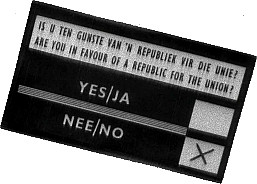 The referendum was held on October 5, 1960, but with a number of electoral changes made before the vote to help favour the republican cause. The Cape Coloured population, largely anti-republican if not pro-monarchist, had already been removed from the common electoral roll and was not allowed the vote in the referendum. The voting age had been reduced to 18 to take advantage of the higher Afrikaner birthrate, and the white electorate of South West Africa (now Namibia) — mostly Afrikaner or German — was allowed to vote in the referendum even though it was a mandate territory and not part of the Union of South Africa. Despite all these factors weighing in the republicans’ favour, the referendum was a close call: 840,458 votes (52.3%) for the republic, 775,878 votes (47.7%) for the monarchy. In one province — Natal, where the English outnumbered the Afrikaners — the No vote had even been in the majority, and one or two went so far as to suggest secession.
The referendum was held on October 5, 1960, but with a number of electoral changes made before the vote to help favour the republican cause. The Cape Coloured population, largely anti-republican if not pro-monarchist, had already been removed from the common electoral roll and was not allowed the vote in the referendum. The voting age had been reduced to 18 to take advantage of the higher Afrikaner birthrate, and the white electorate of South West Africa (now Namibia) — mostly Afrikaner or German — was allowed to vote in the referendum even though it was a mandate territory and not part of the Union of South Africa. Despite all these factors weighing in the republicans’ favour, the referendum was a close call: 840,458 votes (52.3%) for the republic, 775,878 votes (47.7%) for the monarchy. In one province — Natal, where the English outnumbered the Afrikaners — the No vote had even been in the majority, and one or two went so far as to suggest secession.
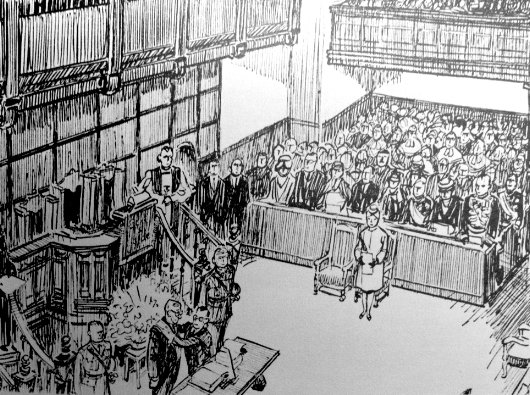
Verwoerd was at least wise enough to ensure that the abolition of the South African monarchy would bring the least amount of constitutional change possible. The constitution remained almost entirely unchanged except that the Crown ceased to exist and the powers of the Governor-General were transferred to a new office of head of state called the Staatspresident, or State President. The Westminster system of government remained, with all its associated traditions. On May 31, 1961, His Excellency Charles Robberts Swart, last Governor-General of the Union of South Africa, was formally invested with the insignia of the office of State President of the Republic of South Africa in the Groote Kerk in Pretoria (see above).
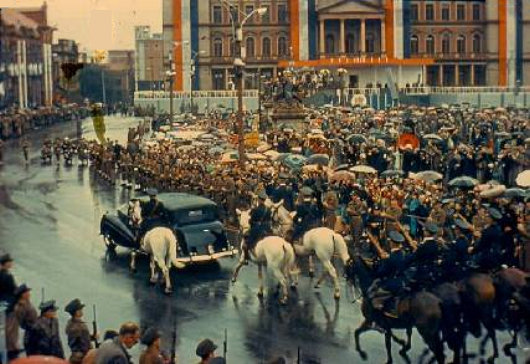
The State President was then relayed to the Kerkplein (Church Square) in the center of Pretoria, accompanied by a mounted escort.
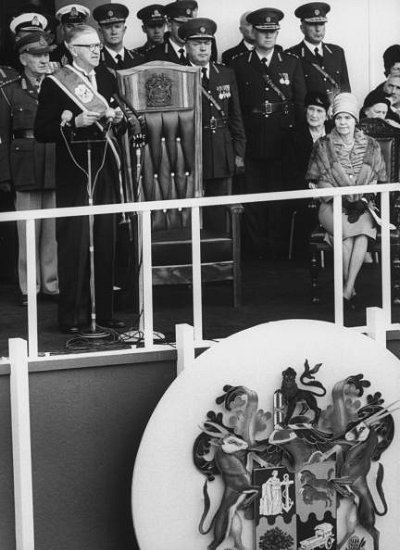
From a specially constructed dias in front of the Palace of Justice and surrounded by various officers of state, he proclaimed the Republic of South Africa…
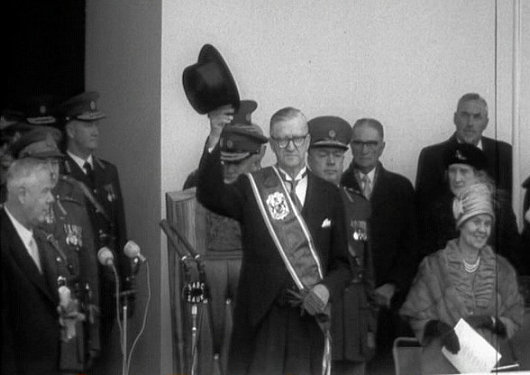
…and acknowledged the enthusiasm of the crowd that had gathered to witness the momentous occasion.
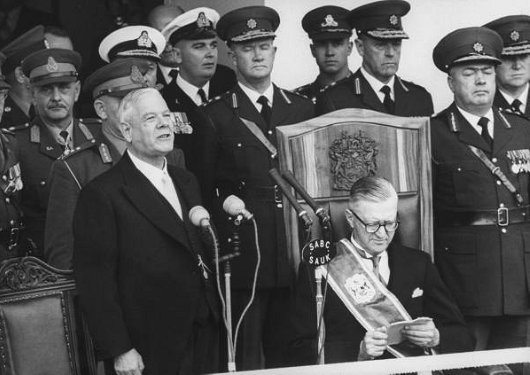
The Prime Minister spoke a few words himself after the State President have finished his speech.
Many of the changes accompanying the abolition of the monarchy were seemingly superficial but nonetheless important. The old regiments of South Africa removed royal references, so the Queen’s Own Cape Town Highlanders became simply the Cape Town Highlanders, while the ships of the South African Navy were redesignated from HMSAS to SAS. Queen’s Counsels became Senior Counsels (as in Ireland and elsewhere). The portraits of past monarchs were removed from the debating chambers and from the Koningsaal in the Houses of Parliament in Cape Town. Still, other royal designations and associations remained, such as the Royal Society of South Africa, the Royal Cape Yacht Club, and the Royal Natal National Park.
Native monarchies persist in South Africa. The King of the Zulus receives a generous subsidy from the South African government, while the Bafokeng tribe under King Leruo Molotlegi is the richest tribe in Africa since a court case gave them a 22% royalty on all platinum mined from their tribal lands. South Africa’s most famous royal is of course former president Nelson Rohlihlahla Mandela, a prince of the Xhosa blood royal, and many princes are known for their participation in politics and society (Prince Mangosuthu Buthelezi being a prominent example). The British trappings of the South African monarchy prevented it from ever becoming the monarchy of the whole country, but the Nationalists were unwise in overthrowing the system rather than just changing the dynasty. If we began this reflection with a quotation from one of France’s greatest writers, it is more appropriate to end it with the words of the greatest South African who ever lived, Field Marshal Jan Christian Smuts: “If a nation does not want a monarchy, change the nation’s mind. If a nation does not need a monarchy, change the nation’s needs.”
Previously: A Good Day in Cape Town
Search
Instagram: @andcusack
Click here for my Instagram photos.Most Recent Posts
- Faithful Shepherd of the Falklands April 8, 2025
- Articles of Note: 8 April 2025 April 8, 2025
- Proportionality Destroys Representation April 8, 2025
- Sag Harbor Cinema March 26, 2025
- Teutonic Takeover March 10, 2025
Most Recent Comments
Book Wishlist
Monthly Archives
Categories



Andrew. General smuts’ comment raises the simple question: why?
Why monarchy? Why privilege of this sort?
Cheers
I was an 12 year old schoolboy at boarding school in Grahamstown in 1961. On the last Sunday before we became a republic there was a church parade and the Queen’s Colours of the First City Regiment was ceremonially laid up in the Commemoration Methodist Church in the city. It was the Union Jack with the badge of regiment on it, and scrolls listing all the major actions the regiment had taken part in since its inception in the 1800’s. It can be seen there hanging near the pulpit to this day. I watched as our school chaplain, Howard Kirkby, who was also the regimental padre, formally received the colours from the officer commanding. Tears slowly trickled down his cheeks. The memory of The Rev’s tears has never left me. That was also the last time we sang “God Save the Queen” as her loyal subjects. It damn nearly lifted the roof off the historic church. We were generally very reluctant republicans in our school. I have often thought since that in 1780’s in the United States there must have been people who felt as forlorn in their new republic as we did then in ours.
I am no friend of republicanism, but surely one cannot blame the Boers for dropping an overlord who had wrested their country from them for reasons of pure profit? Although the British are relatively mild rulers once they are in control, their methods of attaining that control are bloodier and more ruthless than those of any other European nation.
I’m following your series on South Africa with much interest. You have really whetted my appetite for South African history.
Indeed, my dear baron, we cannot blame them, but we can lament their decision all the same.
“(The British).. methods of attaining that control are bloodier and more ruthless than those of any other European nation”. That is a fascinating statement. Actually I think it is wildly inaccurate. In every case? The British split very little blood in British Bechuanaland and in the Bechuanaland Protectorate, but swam in the stuff in Zululand and in India. They wandered in almost unmolested to Australia but had to fight tooth and nail in New Zealand. The Germans were not exactly loved for their gentle ways in Africa and it is unlikely you will see a Herero or Namaqua dancing in lederhosen and singing lieder in a downtown Ochiwarongo Bierstube. No one laughs in Addis Ababa when someone jokes about the Italians passing gas. Belgian waffles are a rarity in the Congo.(In fact everything except horror is in short supply in the Congo). I would like the Baron to be more exact. I am prepared to abandon my scepticism if he can back his strange statement with a few hard and fast facts.
While some Boer generals such as J.B.M Hertzog were strong Republicans, I think that by the time their ideal was achieved long after their deaths, the beautiful ideal of Republicanism has given way to an ugly white Nationalism.
Regarding the “leniency of the British following their surrender to the forces of the Empire” – this, I think, was not so much due to the British, as to Churchill specifically.
Maybe he was humane (more to whites than blacks), or perhaps he foresaw the need for a group that could be the enforcers of white rule, and the protectors of British interests in South Africa and beyond.
You can read Richard Dowden about how Smuts and Churchill laid the foundations of white rule here:
http://www.timesonline.co.uk/tol/comment/columnists/guest_contributors/article2343767.ece
From Smuts’ actions, and from his ridiculous pro-monarchy statement that you quote above, I have to say that if he is really the greatest South African who ever lived, then we must be a very sorry bunch.
And to all who repeat the often repeated propaganda of the British as benign colonists, please read Richard Dowden’s article as well about the “1850s when some 50,000 of Mandela’s own Xhosa people died in a famine triggered by Britain’s seizure of their lands”
“1850s when some 50,000 of Mandela’s own Xhosa people died in a famine triggered by Britain’s seizure of their lands”
I really expected better from Richard Dowden who I thought was really reliable. To make such a mindless sentence is totally irresponsible and not in accordance with history.
50,000 Xhosa people died because of the girl Nongqawuse, who in 1856 told her uncle Mhlakaza that she had met three spirits who told her that the Xhosa must kill all their cattle and destroy all their crops, and if they did this then the dead warrior ancestors would rise from the grave and expel the white men from their land.
Mhlakaza told Chief Sarhili, who ordered all the cattle to be killed and the crops to be destroyed. Of course, tens of thousands of Xhosa died and no one rose from the dead to expel the white man.
This story is well known in South Africa and is documented in many history books. Why does Richard Dowden of the Royal African Society not mention this?
Richard Dowden’s article is full of half-truths — which are much more dangerous than lies. I now know not to trust this man.
Well it certainly made South Africa a better place, what a beacon of peace and prosperity. I think I’ll stick with the Queen of Australia (and Britain et al), thank you very much.
I’m not sure that there is much in that “change the dynasty” thing. Nor can I see why “the British trappings of the South African monarchy prevented it from ever becoming the monarchy of the whole country”; quite the reverse, in fact.
But allegiance to a monarchy is to an institution embodied by a person, rather than to an ethnicity or an ideology. We all know about states defined ethnically or ideologically. And a monarchy (like, for example, hereditary peerage) expresses the reality of sheer good fortune, of Divine Providence conferring on the more fortunate responsibilities towards the less fortunate. All in all, it is no wonder that in Britain the abolition of trade union barons was followed by the abolition of hereditary barons, and no wonder that the BNP wants to abolish the monarchy.
I don’t necessarily blame the Afrikaners for having no affection for the British even now, never mind in 1960. I have stood in the Boer POW cemetery in Saint Helena (where I was born and where my mother’s family comes from) and seen the graves of those boys of 14 and 15, their headstones inscribed in their captors’ language rather than in their own. They really did have grievances that certain other, at least equally noisy Britain-haters did not and do not. But even so.
The Republic of South Africa’s application for Commonwealth membership was blocked by Canada’s John G Diefenbaker, the morally and socially conservative rural populist who opposed official bilingualism in the English-speaking provinces, who campaigned to save the Canadian Red Ensign with the Union Flag in the corner and thus making Canada a nation under the Cross, and who refused to have American nuclear weapons in Canada.
And I was very taken by that bit about lowering the voting age. When that happened in Britain, it brought to power what those voting for them thought were the Selsdon Tories, the proto-Thatcherites who gave economic expression to the moral and social irresponsibility of the Sixties Swingers. In South Africa, it had removed the constitutional ties to the other Commonwealth Realms and to the tradition in which the Crown guarantees the liberties of all the monarch’s subjects. Now that further lowering is on the British agenda, we need to learn the lesson well.
“allegiance to a monarchy is to an institution embodied by a person, rather than to an ethnicity or an ideology”
Indeed, but because that person happened to be British, the Afrikaners refused to acclimatize themselves to the monarchy.
The Afrikaners, or at least the Nationalist ones, saw only the person and not the institution. Hence, because the monarch of South Africa was British, they were against it.
Oh, I get that. But the Royal Family was very German indeed at the time of the Boer Wars, and still widely whispered of as such even in 1960.
There is something snide and uncomfortably snobbish in the British at home when it comes to others’ places of origin. The British Hanoverians, Saxe-Coburg-Gothas and Windsors have all been hard-working and loyal to their country, have served it admirably in peace and in war. They are as British as any other Briton born, but the cheap shot that they are Germans still zings across their bows every now and then. It is both pathetic and ugly.
“But the Royal Family was very German indeed at the time of the Boer Wars, and still widely whispered of as such even in 1960.”
Nonetheless, the Royal Family were perceived by the Afrikaners as British (as indeed the British perceived the Royal Family) — whatever whispers may have existed in Britain were irrelevant to South Africa in this case.
If what you say is correct, it is self-evident that, on the face of a rather tight result, the lowering of age and the census manipulations to exclude the Coloured seem to have tilted the result.
And I still think the redaction “are you in favour of a Republic for the Union?” is kinda captious as well, since it does not mention what is going to be eliminated: the monarchy. Typically, people tend to say YES to whatever they are offered.
I am respectful of the decission not the least for the Boer grievances mentioned above but, this said, it is true that, as someone pointed out before, this Republican dream eventually derailed into unsustainable white supremacism. The original sin of leaving the Commonwealth may have meant, ironically, the very Rise and Decline of the Boer way of life.
Of course, it wasn’t merely whispered around 1900. It was stated perfectly openly, but not seen as any sort of problem.
The spectacle of those shrieking that Obama was born in Kenya, and is therefore ineligible to be the President of the United States, more than calls to mind British anti-monarchists. Identifying strongly with the either or both of the culturally liberal Left and (the real threat to the Crown) the economically liberal Right, it never takes them long to start about how foreign, and specifically German, the Royal Family is. Just try suggesting that they say the same things about people whose families arrived here far more recently, such as the Irish, the Jews, the blacks or the Asians. They don’t like it. They don’t like it one little bit.
Having to be born here would not be enough for a British “Republic” (ours is already a res publica, of course). Its advocates would insist that Presidential candidates prove that all their ancestors had also been born here, going back at least to the accession of George I in 1714.
Those who say the Royal Family are German miss the point entirely. The keyword here is not Family but Royal.
The reason the Queen inherited the Crown, as did HM’s predecessors from George I onward, is because of the Act of Settlement of 1701. That Act settled the Crown on the senior, legitimate, Protestant descendant of the Most Excellent Electress Sophia of Hanover who joined the Communion of the Church of England not because the Electress was from Hanover or born a Bavarian Wittelsbach princess, but because the was the senior, non-Roman Catholic heir in blood to the Thrones of England, Scotland, France, and Ireland. And how was she the heir? Her mother was the Princess Elizabeth of England etc., eldest daughter of HM King James I & VI of England, Scotland, etc. in whom the Crowns if not the kingdoms were united at the death of Queen Elizabeth I in 1603. And if you trace it back further, it is this essential transmission of the right to the Throne via the Royal Bloodline (rather than via Battle of Bosworth Field, though even there the force of arms of Henry Tudor, later Henry VII, only prevailed WHILE he was claiming the Throne via birthright through his descent – however weak in comparison with, say, his future wife’s – from the Blood Royal of England) that is the qualifying factor to claim the Throne even by right of Conquest (as in the case of the said Henry Tudor).
The Queen is Sovereign through an Act of Parliament to be sure, but the unstated but nonetheless historically important factor here is legitimate descent (and, if successful for any length of time, at least notionally senior descent) via the Blood Royal of England back to William the Conqueror, Duke of Normandy, who obtained the Throne by conquest WHILE also claiming right of descent via the ancient Blood Royal of England (for which he sought and received papal approval) in 1066 by winning the Battle of Hastings against Harold II Godwinson who was not of the Blood Royal of England (i.e. the House of Cerdic aka the House of Wessex whose arrival in post Roman Britain occurred when the tribes that eventually formed the Dutch (incl. the Dutch Boers), the English, and the Germans were still loosely one large cultural grouping confined to the European mainland and a few non-British offshore islands).
Now if South Africa’s Dutch Boers – or anyone else – object to the Royal Family on ethnic grounds, they should get it right, and go to the element of their ethnicity that makes them our Royals, that is to say, our Monarchs’ Royal Bloodline from the Rulers of England, and state that they detest their traditional Norman French enemies, rather than their erstwhile allies, the Germans (by which read the Prussian, Brandenburgian Hohenzollerns!)
“For every monarchy overthrown, the sky becomes less brilliant, because it loses a star,”.
Perhaps the best words ever uttered by man.
“The British trappings of the South African monarchy prevented it from ever becoming the monarchy of the whole country,”
Interesting, but what would have been the alternative? Prince Arthur, Duke of Connaught, who served as Governor General? He spoke Dutch, which had not been replaced by Afrikaans, but his son died, leaving no heirs.
Perhaps a monarchy on the Malaysian model would have been better, with the position of sovereign being rotated among different rulers. Malaysia is a federation with thirteen states, nine of which have their own monarchies – every five years, they choose one of their number as King for a fixed term.
One correction: the ship prefix HMSAS was dropped in 1952, and replaced by SAS – http://www.navy.mil.za/aboutus/history/ambassadors.htm – while the St Edward’s Crown was replaced by the Lion of Nassau in 1959. Neither the South African Navy nor the Air Force were given the ‘Royal’ title.
In Australia, most of the states have now scrapped Queen’s Counsels in favour of Senior Counsels, as did New Zealand under the last Labour government – the current National one has brought them back. By all means get rid of these references to monarchy – but only after the monarchy itself has been got rid of. (However in Fiji, the Republic of Fiji Military Forces still has the St Edward’s Crown in its badge!)
Everyone on this forum seems to be making a good point but what they are forgetting is that today 80% of the south african population are natives. English and Afrikaaners only make up 10% of the population. Fact is I don’t think the natives who suffered immensely under both would be interested in a european as their monarch. There are 7 recognised tribal kings numerous paramount chiefs and minor chiefs. Why not have a king from any of these existing african royal blodlines? Might I also remind you that south africa is under majority rule (I.e black rule) you’d have tough time explaining why a British monarch is worthier than an african monarch
Lwazi, that’s exactly why I mentioned Malaysia, where there are nine indigenous monarchs, who take it in turns to be King every five years. (During that time, whoever serves as King appoints a regent to serve as ruler of that state).
http://thestar.com.my/news/story.asp?file=/2010/6/5/nation/6380677&sec=nation
That could have been a model for a Federation of South Africa, maybe with the Kings of Lesotho and Swaziland. However, South Africa is unlikely to have a ceremonial President, much less a monarchy!
In reply to Lwazi Canca’s point about the worthiness of a British versus an African (native) monarch, I think one aspect of how I would address this point is not so much on the grounds of worthiness, but on one form, but not the only form, of appropriateness. The nation that is now South Africa was brought together under the British monarch and British sovereignty rather than by any of the five hereditary African monarchs, so there is a certain symmetry or appropriateness to having that monarch continue to reign over South Africa. After all, it was that monarch whose role was replaced by the rotten Apartheid-inspired Republic voted on in 1960. The five African monarchies continued and continue, and long may they reign, but they are not the monarchy of greatest relevance to this question. That is the South African Monarchy which was the same as the Crown of the United Kingdom of Great Britain and Northern Ireland, the Crown of Canada, the Crown of New Zealand, the Crown of Australia, the Crown of Fiji, the Crown of Grenada, the Crown of Jamaica, etc., irrespective of colour or race, but reflecting the origins of the Crown in question in the overseas lands in question.